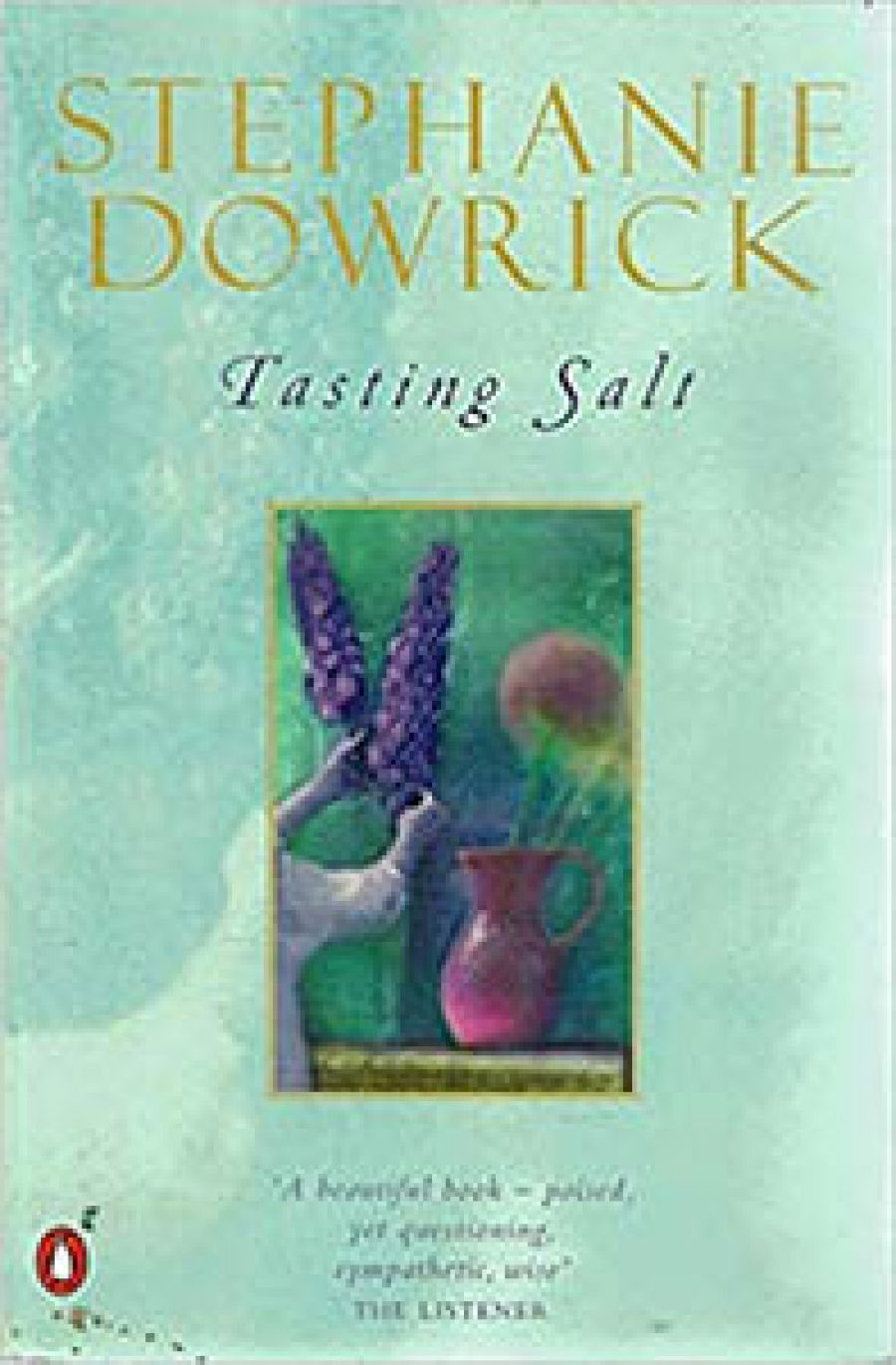
- Free Article: No
- Contents Category: Fiction
- Review Article: Yes
- Article Title: The Taste of Freedom
- Online Only: No
- Custom Highlight Text:
This quote from Buddha opens Tasting Salt, Dowrick’s second novel, and freedom is its main theme. But the freedom in question is of the quiet domestic kind rather than the revolutionary clenched-fist-and-anthem kind. Cordelia, preparing a cocktail party for her seventy-third birthday, suddenly finds herself a widow after fifty years of marriage to George. George’s departure precipitates a crisis of self. No longer able to define herself simply as ‘George’s wife’ or even ‘George’s widow’ she finds herself confronted by the past and unresolved questions of identity, sexuality, and gender. Cordelia’s odyssey, frequently confusing and sometimes painful ultimately brings her a modicum of joy and renewed faith.
- Book 1 Title: Tasting Salt
- Book 1 Biblio: Viking $19.95 pb, 342 pp
In fact, Dowrick is at her best when anatomising George and Cordelia’s marriage: the love mixed in with the petty jealousies; the acts of betrayal and infidelity mitigated by equal acts of generosity; the irritations and admirations. Cordelia hints at her ambiguous feelings for George.
I saw George on the high end, of course, the end that allowed for magnificent long distance views … I saw myself weighting down the lower end: heavy as lard, close to the ground, viewless and unviewed.
Tasting Salt is a slow moving contemplative book with a restrained, mannered style that, conversely, conveys the full extent of Cordelia’s grief. Shortly after George dies she enters the bathroom only to have her attention caught by George’s toothbrush, his after-shave and disposable razors, a few dried hairs, and a bathrobe with two saved rubber bands and a crumpled handkerchief in the pocket. These relics are arranged as a memento mori to her dead husband – which is as poignant and affecting as the image of Cordelia shyly wearing her dead husband’s cooking apron.
Less successfully, however, this mannered prose style flattens out other emotions and characters in the novel. Increasingly the tone seems more affected than effecting. The males in the book are ‘good fellows’ and the women are ‘dear girls’; flowers have a ‘heavenly sheen’, plates are ‘sumptuous’, all manner of food is ‘delicious’ and ‘sensational’, and most of the other characters in the book are ‘precious’,’ clever’, ‘charming’, ‘kind’, and ‘dear’. This may have been a deliberate ploy to mimic the vernacular and delivery of a well-educated seventy-something woman but when all the other characters in the book begin to speak in the same way, it becomes irritating and banal. It is the kind of novel where, regardless of the crisis – be it death or deep depression – some civilised person offers tea and toast and quickly moves the conversation into calmer waters. There is no wailing and gnashing of teeth, no naked shows of vulnerability or emotion. Similarly there are no hesitations, stammerings, or poorly expressed thoughts in Cordelia’s neat middle class world. People pop in and out of Cordelia’s kitchen, deliver a well-worded manifesto or two, and then pop out again. At one point Bronwyn speaks to Cordelia of her experiences in Africa (‘I know you’ve read Olive Schreiner, Cordelia and Doris Lessing’s African stories so, of course, you can imagine for yourself what it was like’.) Bronwyn is careful to point out that ‘(T)hose were still the dreadful days when most whites quite unselfconsciously referred to Africans as ‘Afs’ and ‘ (W)hen it dawned on me what they were doing I was shattered by the contempt that diminutive expressed … How vile!’. This is followed by a comment on the ‘unselfconscious display of inner grace’ by African woman before the airy conclusion that although ‘(T)hey were servants badly paid, shockingly housed, having to do dreary work for white racists occupying and changing their country. And probably putting up with crap from their men when they got home. Yet I believed I was not freer than they.’
What price freedom? And as far as a friendly tea-and biscuit conversation goes, it makes a great Sermon on the Mount. At the end of this conversation Bronwyn rhetorically asks Cordelia, ‘Did we really have this conversation Cordelia? Isn’t this the kind of talk that only goes on in books?’ Well, um, yes actually.
Dowrick has attempted a courageous novel that deals with questions of heterosexual love, lesbian love, and perhaps more controversially, love and sex for the elderly. Unfortunately it is let down by its mannered tone. It is difficult to believe in the urgency or divisiveness of the issues when everything is covered in a fine glaze of charm and niceness. Epigrammatically perhaps, Cordelia describes a dish prepared for her as having a ‘touch more chilli than I would have dared’. A touch more chilli in Tasting Salt might have made it more palatable.


Comments powered by CComment